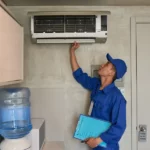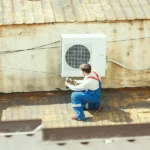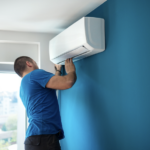We rely on our air conditioners to keep us cool and comfortable, but do we really understand how they work? There’s a lot of misinformation out there that can make using your AC feel more complicated than it needs to be.
In this blog, we’ll bust seven air conditioning myths and state the facts so you can enjoy a cool home without confusion.
7 Common Air Conditioning Myths and Facts
Air Conditioning Myth 1: Lowering the Thermostat Cools Your Home Faster
The Truth: Lowering the thermostat setting does not cool your home any faster. Air conditioning units cool at a constant rate, regardless of the thermostat setting. Lowering the thermostat will only make the system work longer, potentially leading to higher energy bills.
The best way to cool your home efficiently is to set the thermostat to your desired temperature and allow the system to run its cycle. Using a programmable thermostat can also help by cooling your home gradually and maintaining a consistent temperature.
Air Conditioning Myth 2: Air Conditioners Only Cool the Air
The Truth: Air conditioning units do more than just cool the air; they also dehumidify it. Removing moisture from the air makes your home more comfortable and helps prevent mold and mildew growth. This dual function is particularly important in humid climates, where high humidity levels can make the air feel warmer than it actually is. Dehumidification helps improve indoor air quality and can make lower temperatures feel more comfortable.
Air Conditioning Myth 3: Bigger Air Conditioners Are Always Better
The Truth: An oversized air conditioning unit can lead to inefficient operation and increased energy costs. Properly sized units are essential for optimal performance. An HVAC professional can help determine the right size for your space.
An oversized unit will cycle on and off more frequently, leading to inconsistent temperatures and increased wear and tear on the system. On the other hand, an undersized unit will struggle to cool the space effectively, running continuously and using more energy.
Air Conditioning Myth 4: You Don’t Need to Change the Air Filter Of+ten
The Truth: Air filters should be changed regularly, typically every 1-3 months, depending on usage and the manufacturer’s recommendations. A dirty filter can reduce efficiency and lead to poor indoor air quality. Filters trap dust, pollen, and other particles, preventing them from circulating through your home, therefore, triggering your allergies.
When filters are clogged, airflow is restricted, forcing the system to work harder and potentially leading to overheating or system failure. Regular filter changes are a simple and cost-effective way to maintain your system’s performance and improve indoor air quality.
Air Conditioning Myth 5: Closing Vents in Unused Rooms Saves Energy
The Truth: Closing vents can actually increase pressure in the ductwork, leading to leaks and reduced efficiency. It’s better to use a programmable thermostat to manage temperatures throughout your home.
Closing vents disrupt the balance of your HVAC system, causing it to work harder to distribute air evenly. This can lead to increased wear and tear, higher energy bills, and potential damage to the system. Instead, focus on maintaining consistent airflow and temperature control throughout your home.
Air Conditioning Myth 6: Air Conditioners Are Only Needed in Hot Climates
The Truth: Air conditioning units are useful in various climates for cooling and dehumidifying. Even in cooler climates, they can improve indoor air quality and comfort. During warmer months, they help maintain a comfortable indoor temperature and reduce humidity levels.
In cooler climates, air conditioners can still be beneficial during occasional heat waves or humid periods. In addition, many modern HVAC systems include both heating and cooling capabilities, providing year-round comfort and efficiency.
Air Conditioning Myth 7: Maintenance Is Not Important for New Units
The Truth: Regular maintenance is crucial for all air conditioning units, new or old. Maintenance helps ensure efficiency, extends the lifespan of the unit, and prevents costly repairs. Even new units can benefit from routine check-ups to catch potential issues early and ensure the system runs at peak performance.
Neglecting maintenance can lead to decreased efficiency, higher energy bills, and unexpected breakdowns. Investing in regular maintenance can save you money and extend the life of your air conditioning system.
Want to know more? Check out these eight cool air conditioner facts.
Some Tips to Help Your Maintain Your Air Conditioning Unit’s Longevity
Maintaining your air conditioner is essential for ensuring its efficiency and longevity. Now that you know the common airconditioning facts and myths, it’s time to implement these key steps to keep your system in top shape:
- Regular Filter Replacement: Change the air filter every 1-3 months to ensure proper airflow and efficiency. A clean filter helps your system run smoothly and prevents dust and debris from circulating in your home.
- Professional Inspections: Schedule annual inspections with an HVAC professional to check for issues and perform routine maintenance. A professional can identify potential problems early and recommend necessary repairs or adjustments.
- Clean the Coils: Dirty coils can reduce efficiency. Clean the evaporator and condenser coils regularly to ensure optimal heat exchange. This helps your system cool more effectively and reduces energy consumption.
- Check the Thermostat: Ensure your thermostat is working correctly, and consider upgrading to a programmable model for better energy management. A programmable thermostat can help you maintain a consistent temperature and reduce energy usage when you’re not home.
- Clear the Area Around the Unit: The outdoor unit must be free of obstructions, such as debris, plants, and other objects, to allow proper airflow,
Debunk Myths to Maintain Your AC in Tiptop Condition
Understanding and debunking these common air conditioning myths can help you use your system more effectively and efficiently. Regular maintenance and proper use are vital in ensuring your air conditioner performs well and has an extended lifespan. With these tips, you can keep your home comfortable and your energy bills in check.
Find out how to make your air conditioner last longer. Contact us for your various HVAC needs today!






